If Montreal Canadiens defenseman Jeff Petry were a fairy-tale character, he would probably be Goldilocks. That makes Petry’s new four-year, $25 million deal the porridge, as it feels just about right, at least from a term perspective. With regard to the cap hit, Canadiens general manager Marc Bergevin has seemingly gotten a bargain
Credit to Bergevin, who must have felt as though he had no choice but to re-sign Petry. After all, as a member of the Habs, Petry has earned at least 40 points for three straight seasons and had been on pace for his fourth-straight career-high after earning 40 in just 71 games.
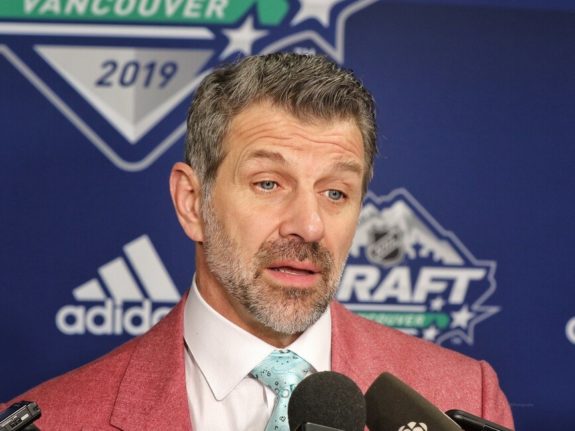
In some respects, Petry is arguably the Habs’ No. 1 defenseman, making the $6.25 million hit, which kicks in at the start of the 2021-22 season, a veritable steal. The only question is whether or not Petry, who’s now 32, will still be as effective at age 37, when it expires in 2025. To put it in perspective, Shea Weber, who’s two years older, will still be under contract for $7.857 million on average for another season after that, until 2026.
So, it’s clear Bergevin just signed one of his better contracts, even considering the no-movement clause. If this piece were a list of Bergevin’s best deals as GM, the trade that brought Petry to the Habs would have a shot at first place. After all, Bergevin only gave up a second-round pick (Jonas Siegenthaler) and a conditional fifth that became a fourth (Caleb Jones) after the Habs advanced past the first round those playoffs.
As it happens, looking at his body of work as a whole, the deal just misses the list of Bergevin’s best extensions, with a familiar name ranking at No. 5 overall:
5. Jeff Petry (six years, $33 million; 2015)
Part of the reason Bergevin initially gave the Edmonton Oilers as little as he did for Petry was due to how he had been scheduled to hit unrestricted free agency in 2015. It’s somewhat shocking, considering he was only 27 and, generally speaking, teams tend to lock up talents of Petry’s caliber.
However, from then-Oilers GM Craig MacTavish’s perspective, they had to challenge Petry by signing him to a one-year deal entering that 2014-15 season. Ultimately, Petry’s stats weren’t as eye-opening as they are now. According to MacTavish, Petry really only came on entering the second half of that season. Before the trade, Petry had 15 points in 59 games (21-point pace). After it, he notched 7 in the remaining 19 games he played that regular season (30). There’s a big difference between 20 and 30-point defensemen. Petry is now a 40-point one.
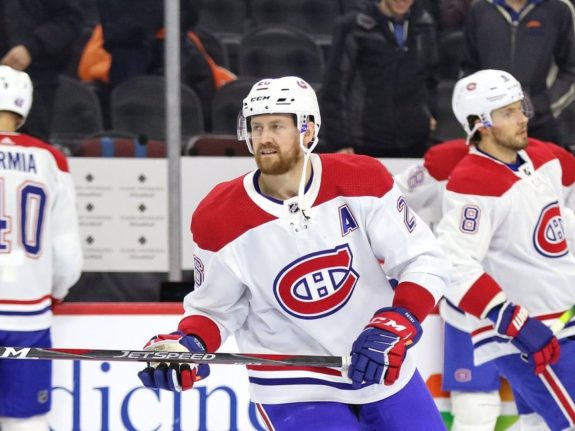
By most accounts, Petry had been willing to negotiate a longer-team deal to stay with the Oilers. Ultimately, Bergevin gave him the long-term deal he wanted, during which he has become a fixture on the Habs’ blue line directly below Weber on the right side. While there had been talk of Bergevin potentially moving Petry ahead of this past season’s trade deadline (even with one year left on the extension), hanging onto him has paid dividends, even if only because it afforded Bergevin the opportunity to re-sign him to his latest extension.
4. Phillip Danault (three years, $9.25 million; 2018)
Bergevin’s prowess on the trade market was also on full display when he acquired Phillip Danault from the Chicago Blackhawks. Giving up just pending unrestricted-free-agents Dale Weise and Tomas Fleischmann, Bergevin got back a second-round pick (Alexander Romanov) and his No. 1 center right now in Danault. However, Bergevin’s mettle also shined through, getting Danault, who has become a perennial 50-point threat, to sign his current deal.
On his entry-level deal with the Blackhawks, Danault simply put failed to show much in the way of offense, scoring five points in the 30 games he got in with them in 2015-16 prior to the trade. Of course, he had only been getting 12:51 per game with them. The following season, after having signed a two-year extension with the Habs, that number jumped to 15:35 with the Habs, with whom he scored 40 points. In 52 games the next season, Danault scored 25, leading to his current three-year, $9.25 million extension.
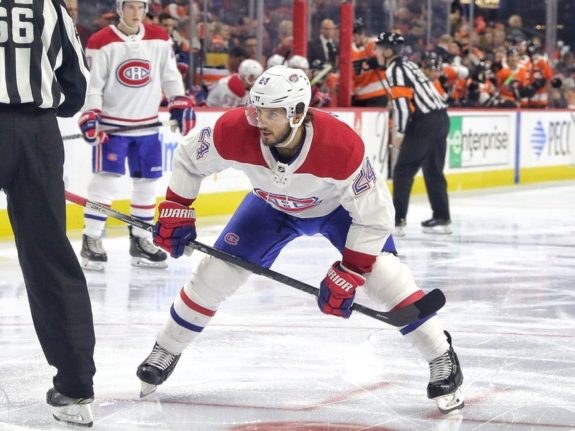
In the first year of that deal in 2018-19, when Danault scored a career-high 53 points, he played 17:47. He also finished seventh in voting for the Selke Trophy, awarded to the league’s best defensive forward. This past season, he played 18:51 and finished sixth, all this success coming on a modest $3.083 million cap hit.
It’s a clear case of Danault making the most of the opportunity Bergevin and the Habs gave him. With one more year left before he becomes unrestricted, the extension may even pay off to a greater extent.
Granted, it remains to be seen where Danault will play with the emergence of Nick Suzuki and Jesperi Kotkaniemi. That’s not just in reference to where in the lineup, but which city, as he’s already been the subject of trade rumors after having expressed a desire to continue to play an offensive role. Regardless, Danault’s next deal, whichever team it’s with, will likely end up being for much higher, evidencing how much of a steal this current one was.
3. Carey Price (six years, $39 million; 2012)
On May 2, 2012, Marc Bergevin became the Canadiens’ GM. On July 2, 2012, he re-signed goalie Carey Price to his previous six-year, $39 million deal, which paid him $6.5 million on average. At the time, Price had shown flashes of brilliance as a still-young, soon-to-be 25-year-old. However, despite revisionist history to the contrary, he had still failed to establish himself as a consistently elite No. 1.
To illustrate, Price’s best season up to that point in his career had been a stellar 2010-11, his first as the team’s undisputed starter. That season, he went 38-28-6 with a .923 save percentage and 2.35 goals-against average. In 2011-12, leading up to negotiations, he went 26-28-11 with a .916 save percentage and 2.43 GAA. He also had only a single series win to his name.
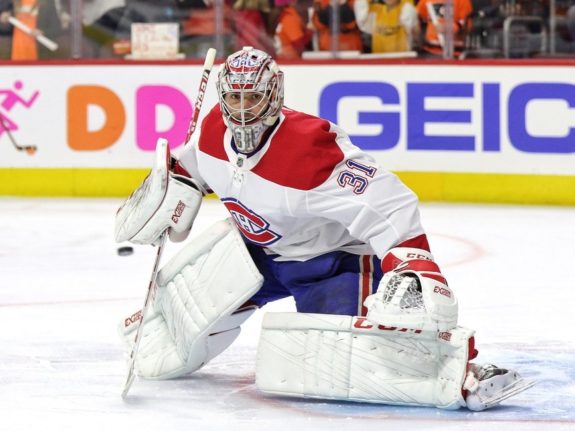
So, the deal was far from a slam-dunk, with Price actually earning a mediocre .905 percentage in 2012-13 to further cast doubts on its cost-effectiveness. However, from that point on, especially following his gold-medal-winning performance at the 2014 Sochi Olympics the following season, Price reached the top of his game… arguably the top of the heap as the best in the world, eventually winning the Vezina and Hart Memorial trophies in 2015.
Price’s latest deal (eight years, $84 million; 2017) is generally considered one of the worst of Bergevin’s tenure. However, looking back at this previous one, things can admittedly change dramatically.
2. Brendan Gallagher (six years, $22.5 million; 2014)
Brendan Gallagher’s sophomore contract was seen as a fairly safe deal, over which he vastly exceeded expectations. Bergevin can’t take credit for having drafted Gallagher. That was officially predecessor Pierre Gauthier. However, Gallagher blossomed with potential as a top-six forward during the Bergevin era, for which he was rewarded with a long-term, six-year deal after just two years in the NHL.
Normally speaking, you’d expect players to sign bridge deals following their entry-level deals, but Bergevin broke with tradition and locked him up, which makes sense. Considering Gallagher’s physical playing style and the hypothetical wear and tear, the six-year deal, which expires in 2021 and brings him to age 29, is especially team-friendly.
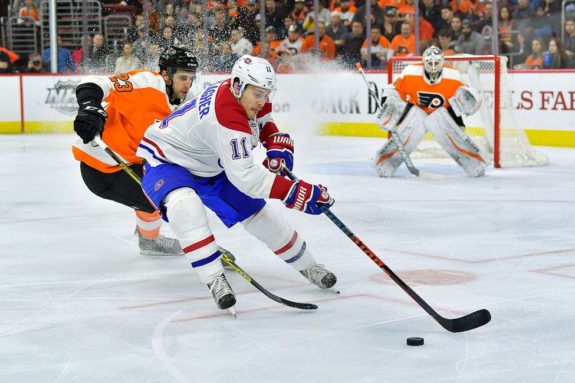
Gallagher scored 19 goals in 2013-14 prior to signing the extension. So, Bergevin was effectively paying for 20-goal potential. Gallagher has transformed into a multi-time 30-goal scorer. Combined with his skill at agitating opponents, Gallagher is arguably one of the best right-wingers in the NHL, all for an average of $3.75 million per season.
The trick for Bergevin would be for him to re-up Gallagher to a deal that makes sense for both parties next season, when this current deal expires. As Price proves, that’s easier said than done after a player provides such exceptional value in the seasons leading up to negotiations.
1. Max Pacioretty (six years, $27 million; 2012)
The less-than-ideal circumstances under which Max Pacioretty left the Canadiens tend to give him a bad reputation. However, even though Bergevin got full value for him in the eventual trade with the Vegas Golden Knights, for a time Pacioretty outperformed expectations to the point that he was regularly considered to have one of the best deals in the NHL, flirting with 40 goals year-in, year-out with a cap hit of just $4.5 million.
Oddly enough, the former Canadiens captain signed it in 2012 after a career-defining, 33-goal, 65-point season as a 23-year-old. While you would think he would have been able to get more, it turns out so did he in retrospect, as he parted ways with his agent at the time, Alec Schall, the next year, with reports pointing to the contract as the primary reason.
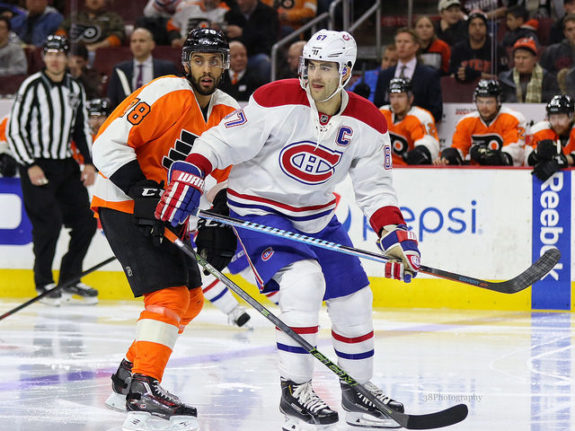
For context, Pacioretty had suffered a broken neck a year earlier and job security might have been a priority for him. That’s all speculation though, and ultimately the deal gave the Habs a top-line left-winger below market value up until 2017-18, when his production dropped drastically and he scored just 37 points in 64 games.
For perspective though, that production would have been largely in line with expectations for anyone else earning a $4.5 million hit at the time. Ultimately, Pacioretty got paid. It took a trade and another agent to do it, but his current $7 million hit is more in line with how he produced during the vast majority of his time with the Habs… and continues to with the Golden Knights.
Many might argue Pacioretty is now in an environment that better suits him, as he doesn’t have to be the guy anymore. While he didn’t enjoy the same playoff success in the role with the Habs, the fact that he spoiled Habs fans with six straight seasons of 60-70 points, leading them in scoring each time, showed he at least has the skill. Now he has the paycheck to match.